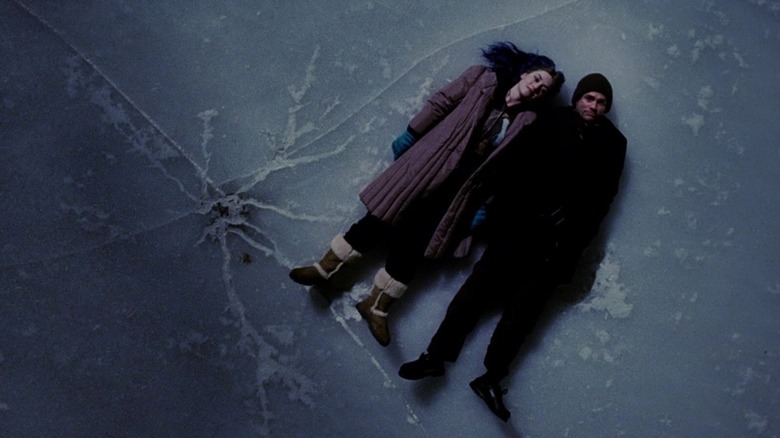The Disturbing Jim Carrey Crime Thriller With A Rotten Tomatoes Score Of 0%
Jim Carrey might be one of the most beloved comedy stars of all time, but one of his darker movies is a total dud.
Carrey, alongside a coterie of Polish actors, leads the 2018 film "Dark Crimes" — and based on how it fared with critics, he likely wishes he'd never participated in the project at all. Based on David Grann's 2008 article in The New Yorker titled "True Crime," which told the story of a mysterious murder that took place in Poland in 2000, "Dark Crimes" began as a potential project for the disgraced director Roman Polanski (who hasn't set foot in the United States for years due to disturbing legal troubles), and though Polanski never ended up making the project, it was ultimately shot on location in Poland. Carrey plays Tadek, a detective investigating a murder that bears eerie similarities to one in a famous novel, and as he continues digging deeper, he starts suspecting the novel's author Kozlov (Marton Csokas).
It's an understatement to say that "Dark Places" underperformed with critics; it's one of a handful of movies with a 0% score on Rotten Tomatoes. So what happened here? Why was this dramatic outing from Carrey such an unexpected critical flop?
Reviewers really didn't like Dark Places
With its 0% rating, the critical consensus for "Dark Places" on Rotten Tomatoes is predictably bleak, reading, "'Dark Crimes' is a rote, unpleasant thriller that fails to parlay its compelling true story and a committed Jim Carrey performance into even modest chills."
Individual reviewers confirmed this consensus, like Owen Gleiberman at Variety, who wrote, "The film's pace never deviates from its hushed, deliberate, anticipatory gaze – it's stuck in thriller-foreplay mode." At The New York Times, Ken Jaworowski agreed, saying, "A good story gets stuck in a puddle of mood in 'Dark Crimes,' a film that strays from its fascinating source – a real-life murder case – into a less successful attempt at noir." Richard Roeper at the Chicago Sun-Times wanted better for the whole endeavor, but was left disappointed: "Source material with great dramatic potential. Talented director and screenwriter. Intriguing cast. That's a promising menu – but the end product leaves a sour taste."
At The AV Club, Ignatiy Vishnevetsky went after Carrey's performance directly, saying, "A few words should be said about Carrey's performance: It may be the worst dramatic acting of his career, a charmless cartoon of self-repression." Ultimately, it was Johnny Oleksinski at The New York Post who had what might have been the cruelest assessment of the film: "That this exercise in vulgarity was made at all is shameful."
Jim Carrey proved he's a great dramatic actor in an entirely different movie
There are a lot of frustrating things about "Dark Crimes," but one that likely stands out for Jim Carrey fans is that the actor is more than capable of turning out an incredible, heartfelt dramatic performance — and he handily proved that in the 2004 film "Eternal Sunshine of the Spotless Mind." The film, directed by Michel Gondry and written by Charlie Kaufman, casts Carrey as Joel Batish, a man who meets and quickly falls for an enigmatic woman named Clementine Kruczynski (Kate Winslet), only for their relationship to fall apart after a relatively short period of time. That's where the central conceit of the film kicks in; Joel finds out about a firm based in New York called Lacuna that's able to delete entire relationships from your brain, cutting down on heartbreak and grief.
Carrey is, as anyone who's seen "Eternal Sunshine of the Spotless Mind" can attest, an absolute revelation in this film. In the midst of the procedure, he realizes he doesn't want to lose his memories of Clementine, and his madcap dash through his own mind is a cinematic sight to behold. It's definitely a shame, with that in mind, that one of his other major drama films turned out to be such a dud.


